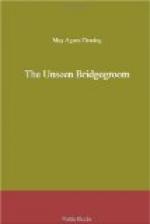“Sitting by the window, looking at the sea,” answered his mother—“always that—with a face the color of snow.”
The gloom on the young man’s face deepened. What if he should prove himself a prophet? What if this spirited, half-tamed thing should go melancholy mad?
“I will go to her at once!” he exclaimed, starting up. “If she goes into a passion at sight of me, it will do her good. Anything is better than this death in life.”
He held out his hand for the key of the room upstairs. His mother handed it to him, and he strode out at once; and then Mrs. Oleander turned her regards upon the new nurse.
Strangers were “sight for sair een” in that ghostly, deserted farmhouse. But the new nurse never looked at her; she sat with those impenetrable green glasses fixed steadfastly on the blazing fire.
CHAPTER XIX.
MISTRESS SUSAN SHARPE.
Dr. Oleander was by no means a coward, yet it is safe to say his heart was bumping against his ribs, with a sensation that was near akin to fear, as he ascended the stairs. He was really infatuatedly in love with his fair-haired little enchantress, else he never had taken his late desperate step to win her; and now, having her completely in his power, it was rather hard to be threatened with her loss by melancholy madness.
“What shall I do with her?” he asked himself, in a sort of consternation. “I must keep her here until I get my affairs settled, and that will be a week at the soonest. If we were safely en route for Havana, I should cease to fear. How will she receive me, I wonder?”
He tapped softly at the door. There was no response. The silence of the grave reigned all through the lonely old house. He tapped again. Still no answer. “Mollie!” he called. There was no reply. The next moment he had inserted the key, turned it, and opened the prison door.
Dr. Oleander paused on the threshold and took in the picture. He could see the low-lying, sunless afternoon sky, all gray and cheerless; the gray, complaining sea creeping up on the greasy shingle; the desolate expanse of road; the tongue of marshland; the strip of black pine woods—all that could be seen from the window. The prison-room looked drear and bleak; the fire on the hearth was smoldering away to black ashes; the untasted meal stood on the table. Seated by the window, in a drooping, spiritless way, as if never caring to stir again, sat bright Mollie, the ghost of her former self. Wan as a spirit, thin as a shadow, the sparkle gone from her blue eyes, the golden glimmer from the yellow hair, she sat there with folded hands and weary, hopeless eyes that never left the desolate sea. Not imprisonment, not the desolation of the prospect, not the loneliness, not the fasting had wrought the change, but the knowledge that she was this man’s wife.
Dr. Oleander had ample time to stand there and view the scene. She never stirred. If she heard the door open, she made no more sign than if she were stone deaf.




